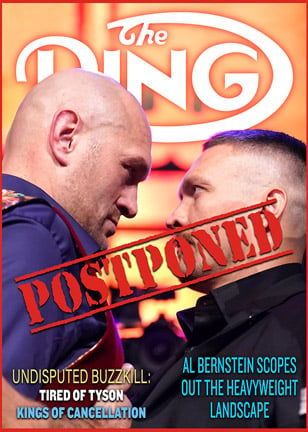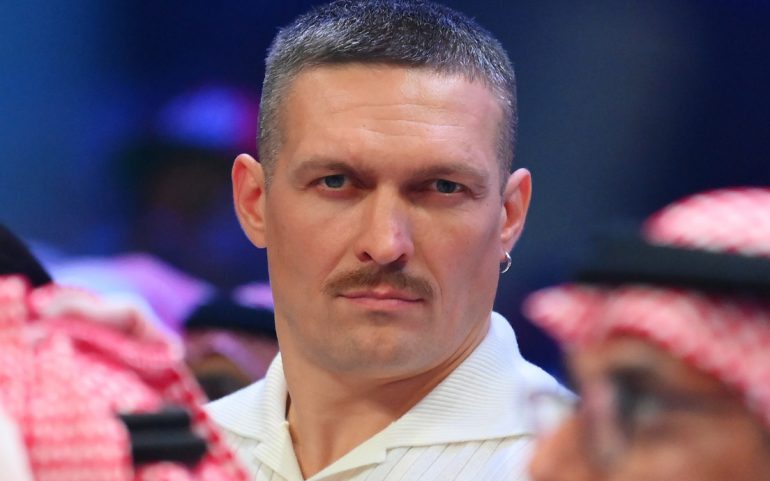
And the Nominees Are …
Above: Will Oleksandr Usyk be the face of heavyweight boxing after he faces Tyson Fury? (Photo by Justin Setterfield/Getty Images)
THREE HEAVYWEIGHT FIGHTS – USYK-FURY, JOSHUA-NGANNOU AND PARKER-ZHANG – WILL DEFINE THE STARS OF TODAY AND PAVE THE WAY FOR THE GLAMOUR DIVISION’S NEXT GENERATION OF LEADING MEN
This is the time of the year when our attention often turns to the Academy Award nominations. This year especially, the nominations for best performances by a lead actor and supporting actor have fueled many conversations and social media posts. When I set upon the task of discussing the heavyweight division, I realized that Oscar season provided the perfect framework for this story.
The matches that are previewed in this edition of Ring Magazine and the boxers in the upper echelon of the heavyweight division fall neatly into those categories. As with the movie actors up for such awards, all the top heavyweights deserve attention and recognition, but some are, well … leading men.
Since 2018, we have had four leading men in the division: Tyson Fury, Deontay Wilder, Anthony Joshua and Oleksandr Usyk. They have won titles, produced blockbuster fights, created rivalries and given some compelling performances. They have brought their unique personalities, quirks, strengths and sometimes frailties to the world stage. In leading roles against each other and against the rest of the division, they have provided big box office for the sport and a story arc that remains unfinished.
All four of these top heavyweights have hinted at retirement, and there is no question this era of heavyweight boxing is in its final stages, but there could still be plot twists that give us excitement and surprises over the next 12 to 24 months.
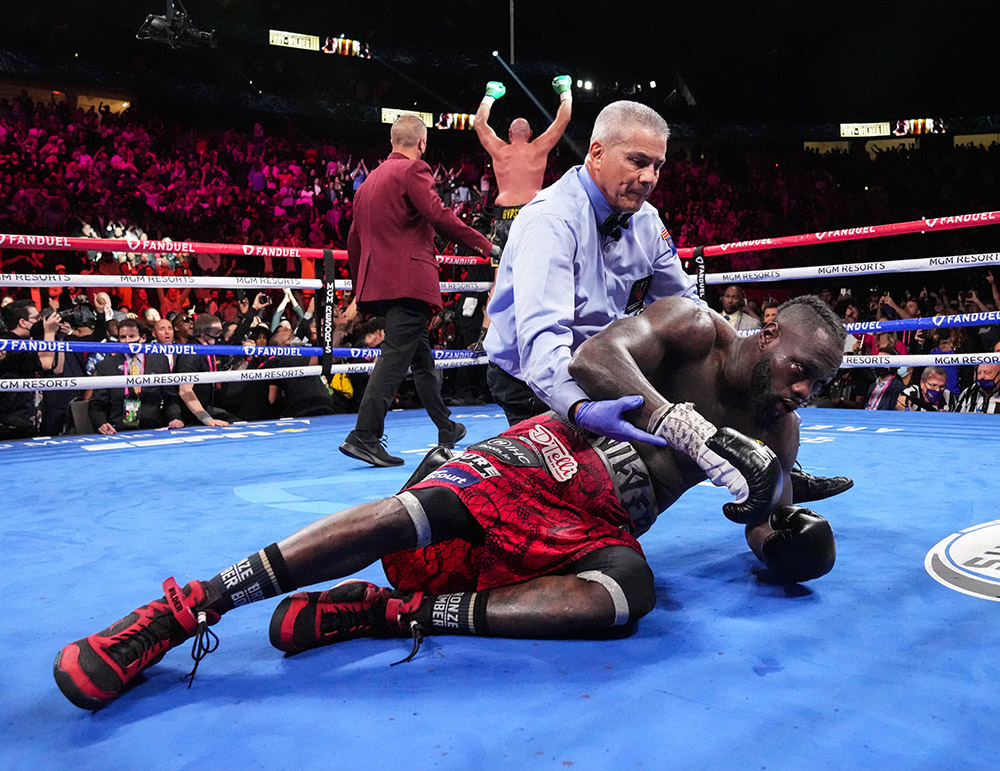
Deontay Wilder was once seen as the heir-apparent to boxing’s biggest crown, but three losses in four fights have all but killed his claim. (Photo by Sean Michael Ham / TGB Promotions)
The match between Fury and Usyk, now rescheduled for May 18, will provide us with an undisputed champion, and it was already a match with questions waiting to be answered. Was the poor performance by Fury against Francis Ngannou just the result of lackluster training, or is it a sign that Fury has slipped? Can Usyk again overcome huge physical disadvantages to win a fight that on paper looks very difficult? Now with the cut suffered by Fury in training causing a several-month delay, the conditioning question for Fury has a new twist. Fury is certainly not the first heavyweight to underperform due to poor training. His countryman Lennox Lewis, for instance, did it in his first fight with Hasim Rahman but righted the ship in the rematch. Fury is 35, an age where heavyweights in recent years have still flourished, but his weight fluctuation and layoffs, the first and longest caused by emotional issues and drug use, may make his 35-year-old body more suspect.

Fury posted this selfie on Instagram to show off his svelte physique (remember, he weighed around 400 pounds at one point) just a few days before the sparring injury. (Photo via Instagram @tysonfury)
But delays that require fighters to restart training can be tricky, and that would be true not just for Fury, but for Usyk as well. Fury said he was in excellent shape when the injury occurred with just a couple of weeks left until the fight, so (if true) that makes the postponement a little less problematic for him.
While his performance against Ngannou was spotty at best, the previous two wins over Dillian Whyte and Derek Chisora were impressive efforts, even if they came against decidedly diminished opponents. Despite the Ngannou fight, it would be foolhardy to think that Fury cannot summon up an excellent effort even with the injury and restart of training. There is no question Fury’s training regimen and focus are more robust than for the Ngannou match. The Fury brand is all about resilience in the face of doubters. He showed that in his title win over Wladimir Klitschko and his draw with Wilder after only two tune-ups following the long layoff. In the first Wilder fight, he defined all this by getting up from the canvas when it seemed impossible to do so. In 43 years of announcing boxing, it is one of the more remarkable things I’ve seen and called from ringside. So, the Tyson Fury we see against Usyk (win, lose or draw) will not give a lackluster effort in any regard. If in fact he is not quite physically the fighter he was before, he will not give in to that easily and will thrive in the face of anyone who dares, based on the Ngannou performance, to think he might be diminished.
Usyk, at 37, stands on the precipice of doing something so historically remarkable that it’s hard to fathom. Over a two-year period from 2016 to 2018, he beat five former or current cruiserweight champions on the road to completely wiping out the division. Now, four-and-a-half years after moving up in weight, he is one win away from becoming the undisputed heavyweight champion. He will be giving away height, reach and even age to Fury, as he did twice to Joshua. And yet, perhaps because of those Joshua fights and other factors, he is not a huge underdog against Fury. If he does succeed in this historically significant quest, it will not be a huge shock. We should all be past underestimating Usyk as a competitor and master boxer.
Usyk, at 37, stands on the precipice of doing something so historically remarkable that it’s hard to fathom.
The quality of this matchup is well worth noting, but the overall importance of the fight to boxing dwarfs the possible entertainment value in the ring. This match follows a year in which boxing has uncharacteristically made most of the important matches available. Many of those were overdue and looked unlikely to be made. The sport moved forward in 2023. While this fight was originally the first megafight of 2024 and perhaps remains the most significant scheduled so far, it really puts an exclamation mark on the big fight achievements of 2023. And if Fury-Usyk portends more of this in 2024, it will mean a lot to the sport of boxing.
So, having said all that about a historically important fight, what do we make of the Joshua-Ngannou match? It is certainly another gimmicky crossover fight driven by commerce as much as anything else. However, its existence is owed to the reality of Fury vs. Ngannou, where a mixed martial arts champion, in his first pro boxing match, gave a lineal boxing champion all he could handle. Many, of course, think he BEAT the heavyweight champion. The boxing world remains split over these crossover matches, but this one occupies a different space because of what Ngannou was able to accomplish only several months ago against Fury. This crossover endeavor seems to have credibility others may have lacked. Or does it?
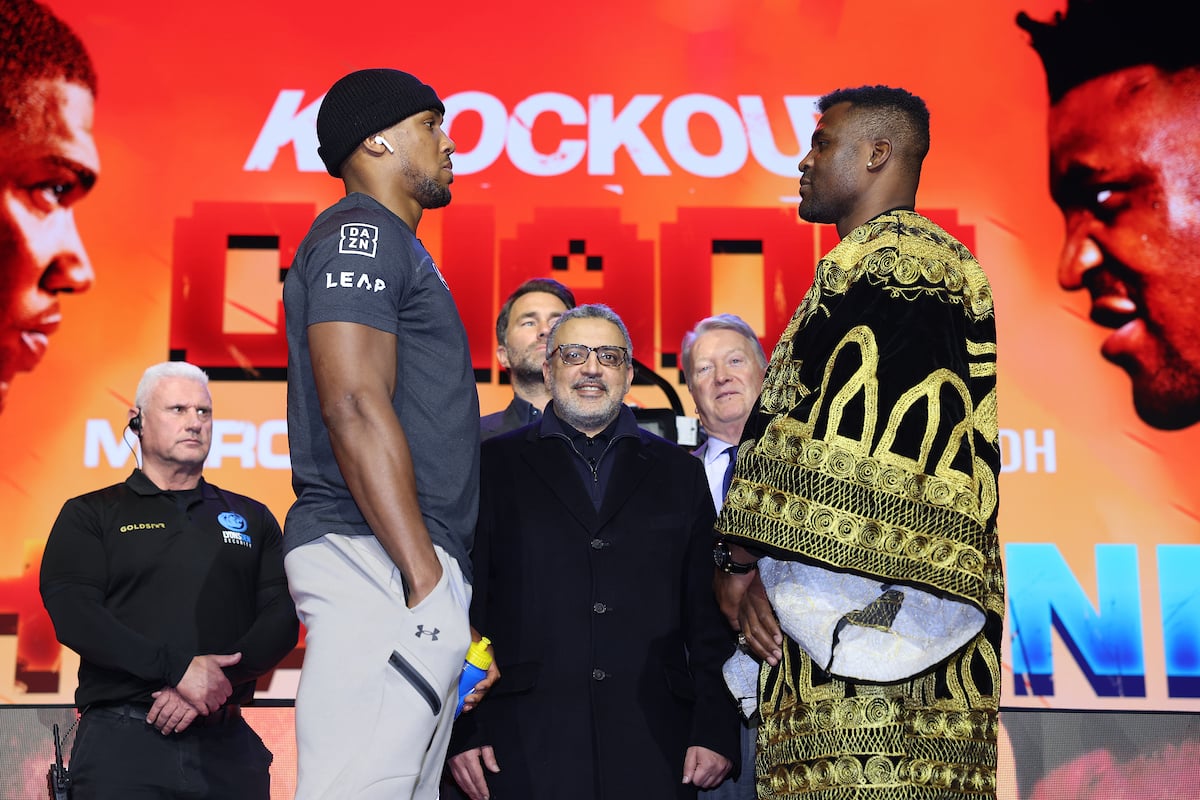
Anthony Joshua (left) and Francis Ngannou face off. (Photo by Mark Robinson/Matchroom Boxing)
The question posed earlier in this article about what percentage of Ngannou’s surprising performance was due to Fury’s negligence or to Ngannou’s own ability is central to this fight. There is no doubt that a large audience will shell some money for the answer when Joshua and Ngannou battle on pay-per-view. No less of a heavyweight authority than former champion Lennox Lewis has been critical of this matchmaking. What, he has wondered publicly, will this do for Joshua beyond lining his pockets with gold, which to be fair is a major component of being a prizefighter. With this enormous payday (certainly not the first in Joshua’s distinguished career) comes a risk. What wold a loss do to Joshua’s future as a boxer, if indeed at 34 he sees that as a long future. Joshua, like the other four leading men, has hinted at retirement sooner rather than later, though he seems energized at the moment. A decisive win over Ngannou would be beneficial to him in his overall standing, when seen in contrast to Fury’s narrow and disputed win. A loss puts future megafights in jeopardy.
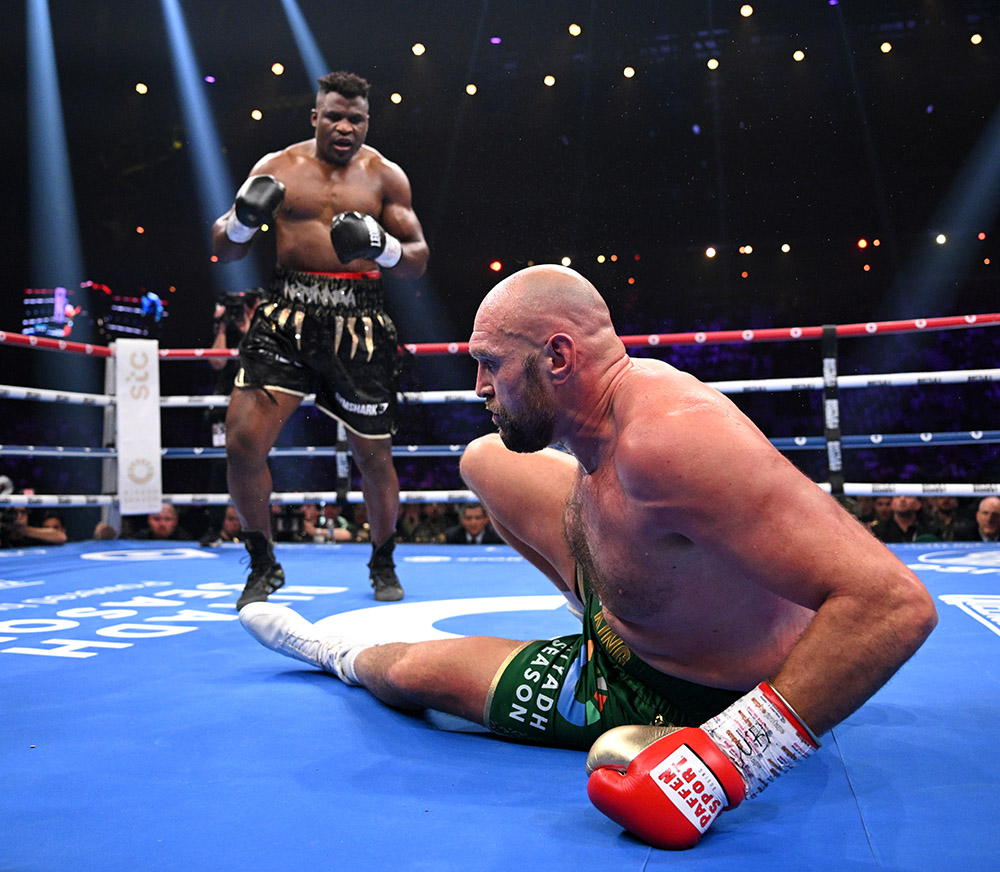
As shocking as it was to see Francis Ngannou put Tyson Fury on the canvas, could he go even farther against Joshua? (Photo by Justin Setterfield/Getty Images)
While Joshua has risks in this match, Ngannou has none … none at all. He is playing with house money. He has already over-achieved as a boxer. He is on the cusp of making his second huge payday as a boxer, coming from a sport where superstars traditionally make less money than superstars in boxing. A loss here does nothing to tarnish his MMA legacy. And then there is the tantalizing (for he and his legion of fans) possibility of an upset. Because he nearly pulled that off against Fury, it is certainly not impossible for lightning to strike. If that happened, certainly it would put the 37-year-old Ngannou in a uniquely enviable position. Even though the loser of Fury-Usyk has the right to an immediate rematch, well, things happen. An injury, failure of the loser to call for that rematch or other unforeseen developments could intervene. Ngannou could be positioned for the THIRD-straight monstrous payday in his three-fight boxing career. And even more astonishing, this boxing novice could end up being the undisputed heavyweight champion. Kind of mind-boggling.
If the personal impact for Ngannou seems huge, what of the broader implications of a Ngannou win? I have always said that all crossover fights between boxers and MMA champs are simply one-offs. I have contended they have no long-lasting impact for either MMA or boxing. I don’t know, however, if my position on this issue will stand up if Frances Ngannou pulls off the upset. There will be a firestorm of opinion led by the goofs masquerading on mainstream sports networks as serious talk-show hosts. They will offer over-the-top takes that suggest boxing is flawed as a sport because of the Joshua loss. They will exaggerate everything for click bait, but it will activate a social media frenzy among media, boxing fans, MMA fans and the many who enjoy both of those sports. But for all that to happen, Ngannou will have to win in the ring, and this will be against a well-prepared Joshua. It will not be an easy task.
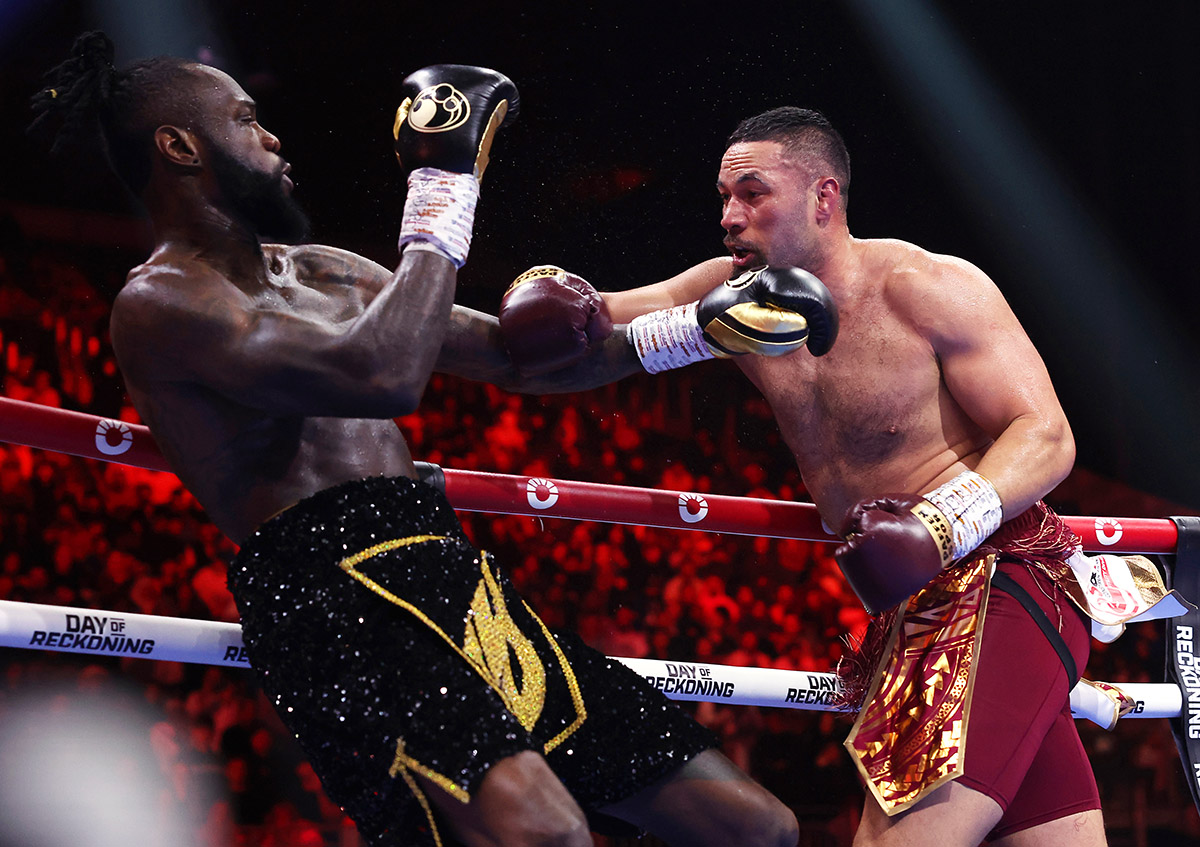
Joseph Parker (right) was comfortably in control throughout his fight against Wilder. (Photo by Richard Pelham/Getty Images)
The events that led to Joshua-Ngannou happening at all bring us to the “supporting actors” in the heavyweight division. One of the nominees for best supporting actor in the division is Joseph Parker. If not for Parker’s upset win over Wilder, we would currently be in the build-up to the long-awaited and previously agreed-on Joshua-Wilder fight. In a career that has had more ups and downs than the stock market, this 31-year-old New Zealander is now, yet again, in a position to move into the leading-man role that so many thought he was destined to occupy. The hallmark of Parker’s career is that he fights often and against the best opposition available to him. That will happen again when he faces Zhilei Zhang, another would-be leading man who has built up some momentum lately. At age 40, Zhang has had a good career just outside the main spotlight of the division, but that changed with his two big wins over Joe Joyce. He thrust himself into contention and now has a chance to prove George Foreman’s bromide that in boxing, life begins at 40.

Zhilei Zhang (left) followed up a sixth-round stoppage of Joe Joyce with an even quicker knockout in the rematch. (Photo by James Chance/Getty Images)
One of the things that has made this period in heavyweight boxing interesting is the number of very good matches between the contenders while they waited for a title shot. Parker, Zhang, Joyce, Chisora, Whyte, Daniel Dubois and occasionally Andy Ruiz have engaged in exciting and interesting matchups that have added spice to the heavyweight landscape. That continues with the high-stakes Parker-Zhang matchup.
All of the leading men and supporting cast in this division are north of 30 years of age, except for Dubois and the exciting young Jared Anderson. Despite two losses, Dubois remains a viable contender with skill and power. Anderson fits the mold of so many young heavyweights of the past – physically gifted, powerful and untested. His litmus test is coming, and it will determine a big part of the next phase of heavyweight boxing.
The three matchups highlighted in this story will propel the final stages of this current heavyweight chapter in the history of boxing. Each of these fights fit into a different niche, but each has important implications. As we wind down on this era, we wonder who will remain a leading man in the division, what supporting actors will make the leap to starring roles and what surprising plot twists await us. These three matches will certainly start to answer those questions.


